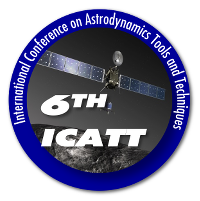Speaker
Mr
Mohamed Khalil Ben Larbi
(Univestität Braunschweig)
Description
This paper derives a control concept for far range Formation Flight (FF) applications assuming circular reference orbits. The paper focuses on a general impulsive control concept for FF which is then extended to the more realistic case of non-impulsive thrust maneuvers. The control concept uses a description of the FF in relative orbital elements (ROE) instead of the classical Cartesian description since the ROE provide a direct access to key aspects of the relative motion and is particularly suitable for relative orbit control purposes and collision avoidance analyses.
Although Gauss’ planetary equations have been first derived to offer a mathematical tool for processing orbit perturbations, they are suitable for several different applications. If the perturbation acceleration is due to a control thrust, Gauss’ variational equations show what effect such a control thrust would have on the keplerian orbital elements. Integrating the Gauss’ variational equations offers a direct relation between velocity increments in the local vertical local horizontal (LVLH) frame and the subsequent change of keplerian orbital elements.
For proximity operations, these equations can be generalized from describing the motion of single spacecraft to the description of the relative motion of two spacecraft. This will be shown for impulsive and finite-duration maneuvers. Based on that, an analytical tool to estimate the error induced through impulsive planning is presented. The resulting control schemes are simple and effective and thus also suitable for on-board implementation. Simulation results show that the proposed concept improves the timing of the thrust maneuver executions and thus reduces the residual error of the formation control.
| Applicant type | First author |
|---|
Primary author
Mr
Mohamed Khalil Ben Larbi
(Univestität Braunschweig)
Co-author
Prof.
Enrico Stoll
(Universität Braunschweig)

